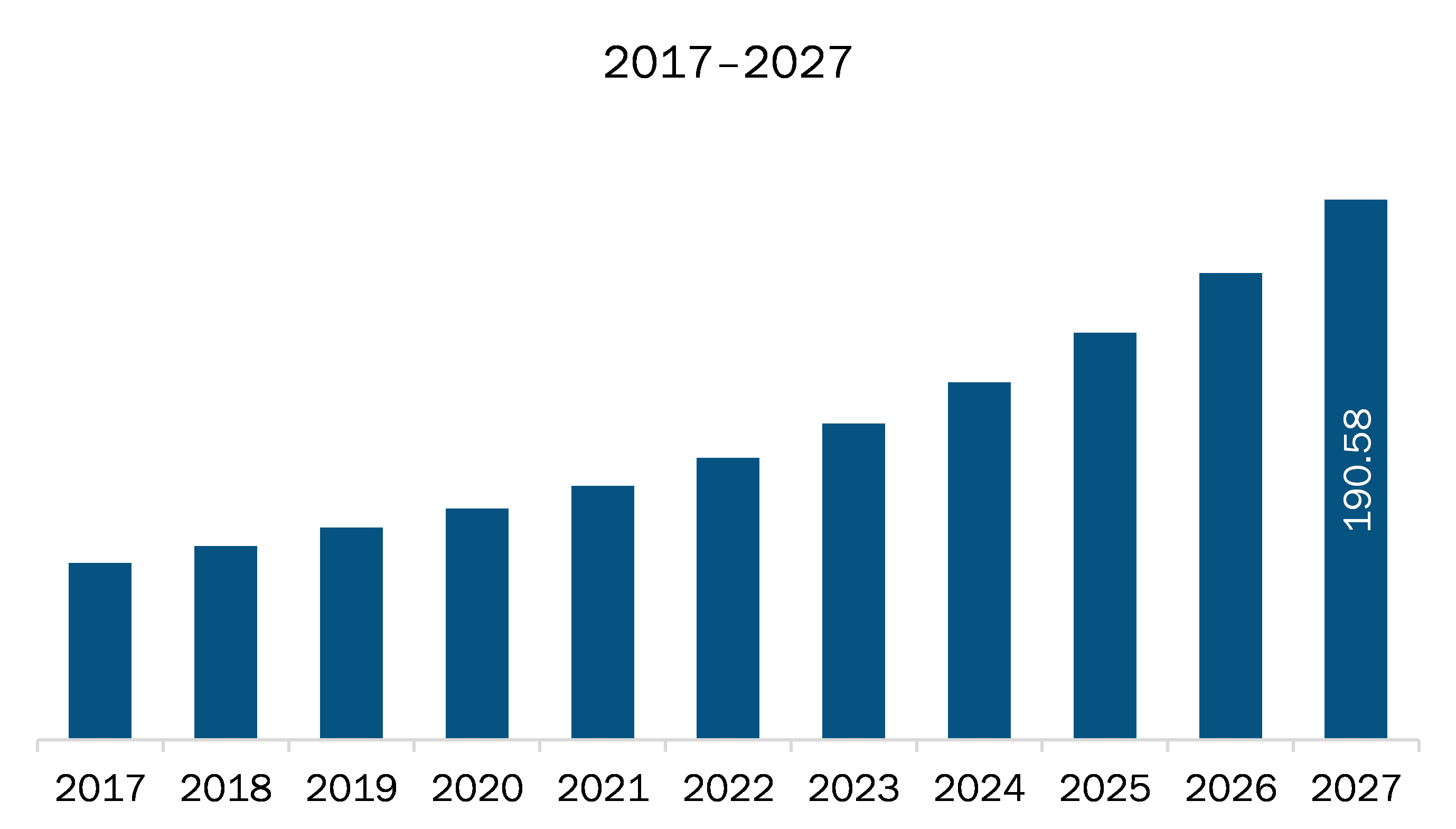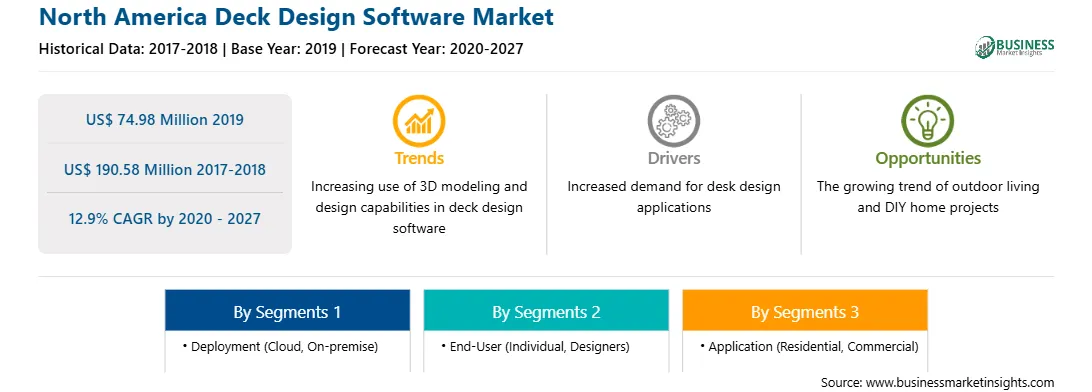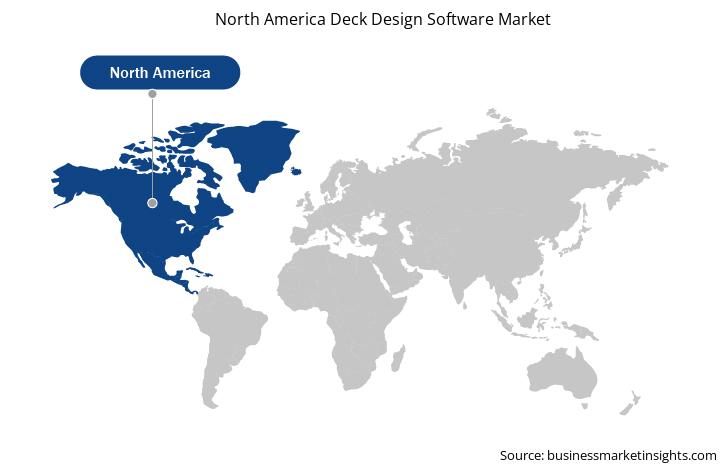Established economies, such as the US, Canada, and Mexico, form North America. The advances in technology across North America have resulted in a highly competitive market for all sectors. Several technological advances from economically powerful countries are also drawn to North America. Companies in the area are continually developing their overall business processes in order to better satisfy consumer expectations for high-quality goods and services. At present, in North America (the US and Canada), the penetration of deck design software, especially in the construction of residential and commercial spaces, is high. Rising investments in technologies by the government bodies and real estate developers to ensure efficient layout and design across all infrastructures in the region are fuelling the growth of the deck design software market. Rise in investments by North American countries, such as the US and Canada, to improve and innovate both residential and commercial or industrial infrastructure is influencing the adoption of solutions across the real estate industry of the region. For instance, in 2018, the private construction spending across the US accounted for US$ 992 billion. Thus, rising complexity in designing modern infrastructure layout across these construction sites is increasing the demand for deck designing software across the region. Thus, Integration of Technology in Deck Design Software is expected to create a significant demand for deck design software market in the coming years, which is further anticipated to drive the deck design software market.
North America has the highest adoption and growth rate of new technologies owing to favorable government policies to boost innovation and strengthen the infrastructure capabilities. Hence, any impact on industries is expected to affect the economic growth of the region in a negative manner. Presently, the US is the world’s worst affected country due to COVID-19 outbreak thereby affecting constructional activities and investments in the sector adversely. With the closure of construction activities across major countries such as United States, Canada and Mexico amongst others to combat the spread of the virus across the region is thereby affecting any new adoption of technology, adversely. However, with the start of economic activities in the region, with strict social distancing norms laid down by the federal government across the countries, real estate companies are more inclined to adopt cloud solutions in order to enable remote working on designing and planning layouts of residential and commercial properties across the region. Thus, the spread of the corona has initially affected the deck design software market severely, but is expected to influence the adoption of cloud based solution over the years

Strategic insights for the North America Deck Design Software provides data-driven analysis of the industry landscape, including current trends, key players, and regional nuances. These insights offer actionable recommendations, enabling readers to differentiate themselves from competitors by identifying untapped segments or developing unique value propositions. Leveraging data analytics, these insights help industry players anticipate the market shifts, whether investors, manufacturers, or other stakeholders. A future-oriented perspective is essential, helping stakeholders anticipate market shifts and position themselves for long-term success in this dynamic region. Ultimately, effective strategic insights empower readers to make informed decisions that drive profitability and achieve their business objectives within the market.

| Report Attribute | Details |
|---|---|
| Market size in 2019 | US$ 74.98 Million |
| Market Size by 2027 | US$ 190.58 Million |
| CAGR (2020 - 2027) | 12.9% |
| Historical Data | 2017-2018 |
| Forecast period | 2020-2027 |
| Segments Covered |
By Deployment
|
| Regions and Countries Covered | North America
|
| Market leaders and key company profiles |
|
The geographic scope of the North America Deck Design Software refers to the specific areas in which a business operates and competes. Understanding local distinctions, such as diverse consumer preferences (e.g., demand for specific plug types or battery backup durations), varying economic conditions, and regulatory environments, is crucial for tailoring strategies to specific markets. Businesses can expand their reach by identifying underserved areas or adapting their offerings to meet local demands. A clear market focus allows for more effective resource allocation, targeted marketing campaigns, and better positioning against local competitors, ultimately driving growth in those targeted areas.

The deck design software market in North America is expected to grow from US$ 74.98 million in 2019 to US$ 190.58 million by 2027; it is estimated to grow at a CAGR of 12.9% from 2020 to 2027. The integration of technologies, such as artificial intelligence and machine learning algorithms, in deck designing software is increasing its efficiency, thereby contributing to the market growth. These technologically advanced solutions operate as a smart tool to print professionally designed deck plans. For instance, Delta Software International LLC offers CAD Pro for creating precise and professional deck designs for landscape decks, hot tub decks, pool decks, deck railing, custom deck plans, multi-level decks, and commercial decks. The software allows in-app purchase for specific needs as per the client’s requirement, such as outdoor kitchens, shade arbors, decks, tree houses, and lake houses. These easy to use plans add value and comfort to the user and also enable them to save overall operational cost. Additionally, CAD Pro’s “Smart Dimensioning” tool enables automatic creation of deck plan dimensions with a few simple clicks, thus, saving overall time in designing. Thus, integration of technology with the software is expected to influence the growth of deck design software market over the years. This is bolstering the growth of the deck design software market.
The market for deck design software market is segmented into by Deployment type, End User and Application, and country. Based on deployment type, the market is segmented into cloud and on-premise. In 2019, the cloud segment held the largest share North America deck design software market. Based on end user type the deck design software market is divided into individual and designers. Individual is expected to the fastest growing segment over the forecast period. On the basis of application, the market is segmented into residential and commercial. The commercial segment accounts for largest market share in the 2019.
A few major primary and secondary sources referred to for preparing this report on the deck design software market in North America are company websites, annual reports, financial reports, national government documents, and statistical database, among others. Major companies listed in the report are AZEK Building Products (TimberTech)
The List of Companies - North America Deck Design Software Market
The North America Deck Design Software Market is valued at US$ 74.98 Million in 2019, it is projected to reach US$ 190.58 Million by 2027.
As per our report North America Deck Design Software Market, the market size is valued at US$ 74.98 Million in 2019, projecting it to reach US$ 190.58 Million by 2027. This translates to a CAGR of approximately 12.9% during the forecast period.
The North America Deck Design Software Market report typically cover these key segments-
The historic period, base year, and forecast period can vary slightly depending on the specific market research report. However, for the North America Deck Design Software Market report:
The North America Deck Design Software Market is populated by several key players, each contributing to its growth and innovation. Some of the major players include:
The North America Deck Design Software Market report is valuable for diverse stakeholders, including:
Essentially, anyone involved in or considering involvement in the North America Deck Design Software Market value chain can benefit from the information contained in a comprehensive market report.